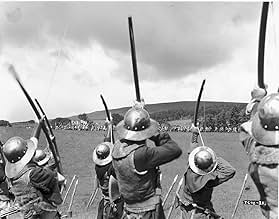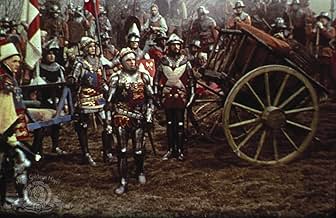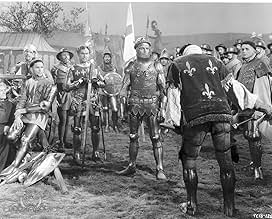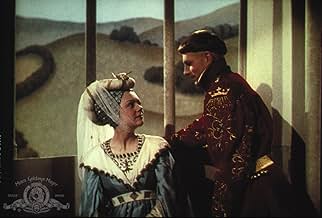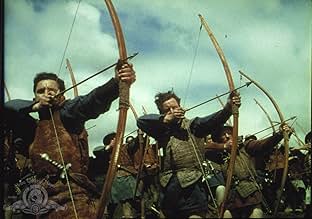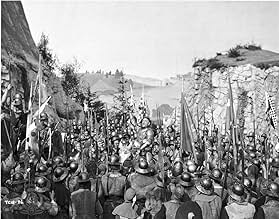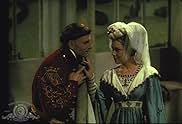Henrique 5º
O filme narra um período heroico na vida de Henrique V, rei da Inglaterra entre 1413 e 1422, que partiu em uma pequena expedição para reivindicar a coroa da França, onde foi recebido pelo ex... Ler tudoO filme narra um período heroico na vida de Henrique V, rei da Inglaterra entre 1413 e 1422, que partiu em uma pequena expedição para reivindicar a coroa da França, onde foi recebido pelo exército francês determinado a impedi-lo.O filme narra um período heroico na vida de Henrique V, rei da Inglaterra entre 1413 e 1422, que partiu em uma pequena expedição para reivindicar a coroa da França, onde foi recebido pelo exército francês determinado a impedi-lo.
- Direção
- Roteiristas
- Artistas
- Indicado a 4 Oscars
- 12 vitórias e 6 indicações no total
Avaliações em destaque
This play is a lot of fun, but it's very frustrating if you haven't read the earlier plays. There are so many poignant (or funny) moments that point backwards. Even the pretend audience at the beginning seems to feel that they want Falstaff back! The best acting moments in this movie are all scenes where the lower characters remember Falstaff and mourn his death.
Of course, there are some heroic battles and speeches in this movie, but looking back after forty years they don't seem as impressive as when I was 13. The great battle is actually over fairly quickly. And a lot of the later scenes drag, like when Captain Fluellen makes Pistol eat his leek. This is played as very bad slapstick when it's actually very violent and brutal in the play.
And lest you're expecting a camera pointed at a stage, don't worry. Olivier, who produced and directed most of his Shakespeare films, has actually used the film medium to enlarge his plays' visual scope, while maintaining the intimacy that is the essence of live theatre. Also, Olivier is mindful of how daunting the language of Shakespeare is for modern audiences and has modified much of the original script to be more comprehensible, while preserving the feel of Elizabethan English.
Olivier's "Henry V" was to England what Eisentein's "Ivan the Terrible" was to Russia a familiar history rendered as a national epic, for morale purposes, while audiences were fighting off the Germans during World War II. There are other parallels. For example, both use static, formalized composition, in Henry V's case meant to resemble the images in medieval illuminated manuscripts and books of Hours. (In Ivan's case, according to Pauline Kael, like Japanese Kabuki.) Thus, a sound stage "exterior" backdrop becomes a tableau that serves to enhance, with its flat perspective and subjective scale, the view we have of that fabulous Age of Chivalry for which the play's Battle of Agincourt was the closing act.
I've always scoffed at the extravagant accolades which show business gives its own. But after seeing this film, or his equally brilliant "Hamlet," I can understand why Laurence Olivier was so good, that a knighthood wasn't enough, and so he was raised to the peerage.
In the early scenes, the movie combines the play itself with a very detailed look at how the play would have been staged in Shakespeare's own day. It's very interesting, and is nicely done. It takes advantage of the slower parts in the early scenes to draw attention to the stage, the players, and the crowd, giving you a very good feel for what the theater was like then. Olivier also uses this device to liven up considerably the long historical discourse of the Archbishop of Canterbury in the play's second scene.
After the early scenes, when the real action begins, the movie wisely pulls away from the theater setting and concentrates on the story itself. Olivier is always good in this kind of role, and the photography and settings do a good job of setting off the action. It is noticeable, though, that Olivier chose to omit several scenes or portions of scenes that have some of the commands showing Henry's harsher characteristics, so that the movie concentrates much more on the king's heroic side. What's left still works fine, but it does lose a little depth without this balance. The rest of the cast is certainly adequate, though most of them are overshadowed by Henry. A couple of the exceptions are Robert Newton, very well cast as Pistol, and Esmond Knight, who works well as Fluellen.
Some minor aspects may keep it from being one of the best Shakespeare adaptations, but it's creative, distinctive, and good entertainment. You can rarely go wrong with anything that combines Olivier and Shakespeare.
Você sabia?
- CuriosidadesThe opening model shot of London was huge, 50 feet by 70 feet in size, and made of plaster. It took four months to construct.
- Erros de gravaçãoHenry V's reign was in the early 1400s, but most of the costuming in the film is from 1600, the time of the plays writing, almost 200 years later. The armor on the other hand is accurate. In fact, there is no anachronism in the costumes. The story is told from two points of view (one in the 1600s, as a performance in the Globe Theater; the other in the 1400s, as the characters originally lived). Costumes shift on purpose according to the point of view.
- Citações
King Henry V of England: Tell the Dauphin his jest will savor but of shallow wit, when thousands weep more than did laugh at it.
- Cenas durante ou pós-créditosThe main title not only gives the full title of the play as William Shakespeare wrote it, but spells the words in the 16th-century manner, not in modern spelling.
- Versões alternativasIn the American release of the film, all references to "bastards" in the dialogue were excised.
- ConexõesEdited into Robur, o Conquistador do Mundo (1961)
- Trilhas sonorasAgincourt Hymn (Deo gracias Anglia)
(uncredited)
Latin hymn text set to anonymous tune (1415)
Arranged by William Walton
Principais escolhas
- How long is Henry V?Fornecido pela Alexa
Detalhes
Bilheteria
- Orçamento
- £ 475.000 (estimativa)
- Faturamento bruto mundial
- US$ 62.619
- Tempo de duração2 horas 17 minutos
- Mixagem de som
- Proporção
- 1.37 : 1
Contribua para esta página




